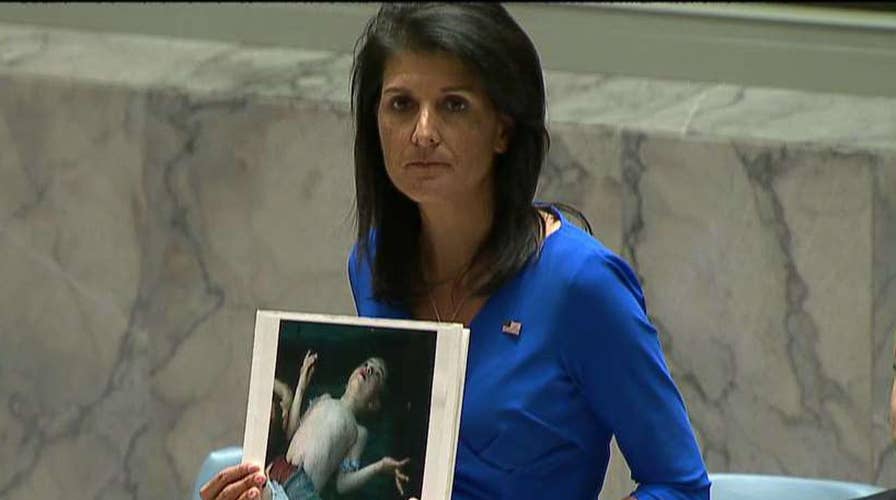Haley: Chemical attack bears the hallmarks of Assad regime
U.S. ambassador to the U.N. addresses chemical weapons attack in Syria
U.S. Ambassador to the U.N. Nikki Haley slammed Russia Wednesday over its past role blocking the body from holding Syria’s Assad regime accountable, while hinting that the U.S. could take unilateral action in the wake of the latest deadly chemical weapons attack.
Speaking during a Security Council emergency meeting convened in the wake of the attack in northern Syria which killed at least 72 people, Haley said evidence indicates the gas is more lethal than Bashar Assad has used before, and held up pictures of victims.
“We cannot close our eyes to these pictures, we cannot close our minds to the responsibility to act,” she said in a speech to the U.N. Security Council, where a resolution condemning the use of chemical weapons by Syria was proposed.
The Trump administration has pointed its finger at Assad, but Russia has claimed that the chemicals were released when Syrian aircraft bombed a rebel-held factory making chemical weapons. At the emergency session, Haley ripped Russia for getting in the way of the United Nations holding Assad accountable after a prior attack in 2013 and accused Russia of defying “the conscience of the world.”
“Russia stood in the way of this accountability, they made an unconscionable choice,” she said, before calling on Russia, which opposed the resolution, to use its influence to effect peace in the region.
“How many more children have to die before Russia cares?” she asked.
Haley then turned her criticism to the U.N. itself, saying it had proved ineffective in dealing with an “illegitimate” regime which she said “has no interest in peace.”
She went on to warn that if the United Nations fails to act collectively, "there are times in the life of states that we are compelled to take our own action."
“We regularly repeat tired taking points in support of a peace process that is regularly undermined by the Assad regime,” she said.
She added, “If we’re not able to enforce resolutions preventing use of chemical weapons, what does that say for our chance of ending the broader conflict in Syria? What does that say of our ability to bring relief to the Syrian people?”
Haley’s remarks mark a change in tone from the initial reaction from the Trump administration, which focused Tuesday on blaming former President Barack Obama for not following through on a threat to Assad that a chemical weapons attack would cross a "red line" and lead to military action.
When Assad carried out an attack in August 2013, the Obama administration instead went on agree to a plan with Russia for international monitors to destroy weapon stockpiles in Syria.
"These heinous actions by the [Assad] regime are a consequence of the past administration's weakness and irresolution," Trump said in a statement.
The Associated Press contributed to this report.




